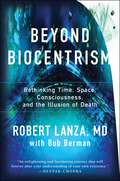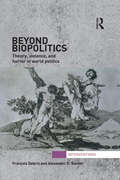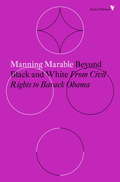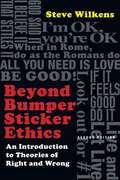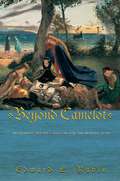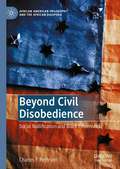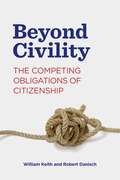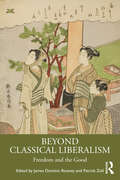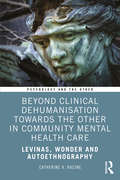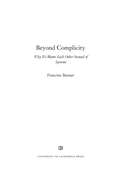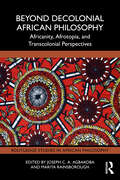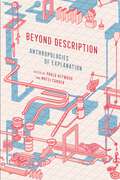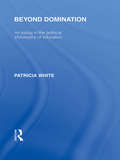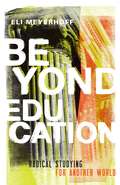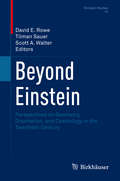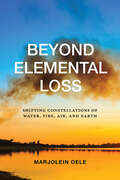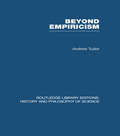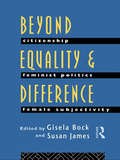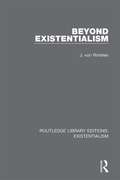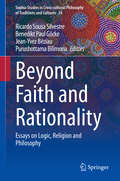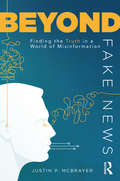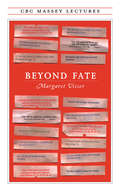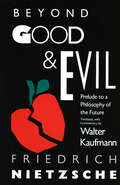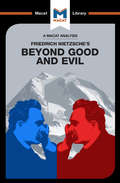- Table View
- List View
Beyond Biocentrism: Rethinking Time, Space, Consciousness, and the Illusion of Death
by Bob Berman Robert LanzaBiocentrism shocked the world with a radical rethinking of the nature of reality. But that was just the beginning. In Beyond Biocentrism, acclaimed biologist Robert Lanza, one of TIME Magazine's "100 Most Influential People in 2014," and leading astronomer Bob Berman, take the reader on an intellectual thrill-ride as they re-examine everything we thought we knew about life, death, the universe, and the nature of reality itself. The first step is acknowledging that our existing model of reality is looking increasingly creaky in the face of recent scientific discoveries. Science tells us with some precision that the universe is 26.8 percent dark matter, 68.3 percent dark energy, and only 4.9 percent ordinary matter, but must confess that it doesn't really know what dark matter is and knows even less about dark energy. Science is increasingly pointing toward an infinite universe but has no ability to explain what that really means. Concepts such as time, space, and even causality are increasingly being demonstrated as meaningless. All of science is based on information passing through our consciousness but science hasn't the foggiest idea what consciousness is, and it can't explain the linkage between subatomic states and observation by conscious observers. Science describes life as a random occurrence in a dead universe but has no real understanding of how life began or why the universe appears to be exquisitely designed for the emergence of life. The biocentrism theory isn't a rejection of science. Quite the opposite. Biocentrism challenges us to fully accept the implications of the latest scientific findings in fields ranging from plant biology and cosmology to quantum entanglement and consciousness. By listening to what the science is telling us, it becomes increasingly clear that life and consciousness are fundamental to any true understanding of the universe. This forces a fundamental rethinking of everything we thought we knew about life, death, and our place in the universe.
Beyond Biopolitics: Theory, Violence, and Horror in World Politics (Interventions)
by Francois Debrix Alexander D Barder'Beyond Biopolitics constitutes a truly serious attempt to think about the unthinkable.' Guy Lancaster, Political Studies Review: 2014 VOL 12, 93. Beyond Biopolitics exposes the conceptual limits of critical biopolitical approaches to violence, war, and terror in the post-9/11-War on Terror era. This volume shows that such popular international political theories rely upon frames of representation that leave out of focus a series of extreme forms of gruesome violence that have no concern for the preservation of life, a crucial biopolitical theme. Debrix and Barder mobilize different concepts—horror, agonal sovereignty, the pulverization of the flesh, or the notion of an inhumanity-to-come—to shed light on past and present ghastly scenes and events of violence that seek to undo the very idea of humanity. To highlight the capacity of horror to be in excess of both violence and the meaning of humanity, Beyond Biopolitics provides a series of engagements with issues much debated in contemporary critical theoretical circles, in particular war and terror, the production of fear, states and spaces of exception, and alterity as enmity. This work will be of great interest to scholars of critical international relations theory, critical security studies and international relations.
Beyond Black and White: From Civil Rights to Barack Obama
by Manning MarableHighly acclaimed dissection of the "new racism," from one of the greatest radical black intellectuals of our timeMany in the US, including Barack Obama, have called for a 'post-racial' politics: yet race still divides the country politically, economically and socially. In this highly acclaimed work, Manning Marable rejects both liberal inclusionist strategies and the separatist politics of the likes of Louis Farrakhan. Beginning by looking back at African-American politics and the fight against racism of the recent past, outlining a trenchant analysis of the 'New Racial Domain' that must be uprooted, he argues powerfully for a 'transformationist' strategy, which retains a distinctive black cultural identity but draws together all the poor and exploited in a united struggle against oppression.From the Trade Paperback edition.
Beyond Bumper Sticker Ethics: An Introduction to Theories of Right and Wrong
by Steve WilkensIdeas have consequences. And sometimes those ideas can be squeezed into slogans, slapped on bumper stickers and tweeted into cyberspace. These compact messages coming at us from all directions often compress in a few words entire ethical systems. It turns out that there's a lot more to the ideas behind these slogans--ideas that need to be sorted out before we make important moral decisions as individuals or as societies. In this revised and expanded edition of Steve Wilkens's widely-used text, the author has updated his introductions to basic ethical systems:cultural relativismethical egoismutilitarianismbehaviorismsituation ethicsKantian ethicsvirtue ethicsnatural law ethicsdivine command theoryHe has also added two new chapters:evolutionary ethicsnarrative ethicsWith clarity and wit Wilkens unpacks the complicated ideas behind the slogans and offers Christian evaluations of each.
Beyond Camelot: Rethinking Politics and Law for the Modern State
by Edward L. RubinThis book argues that many of the basic concepts that we use to describe and analyze our governmental system are out of date. Developed in large part during the Middle Ages, they fail to confront the administrative character of modern government. These concepts, which include power, discretion, democracy, legitimacy, law, rights, and property, bear the indelible imprint of this bygone era's attitudes, and Arthurian fantasies, about governance. As a result, they fail to provide us with the tools we need to understand, critique, and improve the government we actually possess. Beyond Camelot explains the causes and character of this failure, and then proposes a new conceptual framework, drawn from management science and engineering, which describes our administrative government more accurately, and identifies its weaknesses instead of merely bemoaning its modernity. This book's proposed framework envisions government as a network of connected units that are authorized by superior units and that supervise subordinate ones. Instead of using inherited, emotion-laden concepts like democracy and legitimacy to describe the relationship between these units and private citizens, it directs attention to the particular interactions between these units and the citizenry, and to the mechanisms by which government obtains its citizens' compliance. Instead of speaking about law and legal rights, it proposes that we address the way that the modern state formulates policy and secures its implementation. Instead of perpetuating outdated ideas that we no longer really believe about the sanctity of private property, it suggests that we focus on the way that resources are allocated in order to establish markets as our means of regulation. Highly readable, Beyond Camelot offers an insightful and provocative discussion of how we must transform our understanding of government to keep pace with the transformation that government itself has undergone.
Beyond Civil Disobedience: Social Nullification and Black Citizenship (African American Philosophy and the African Diaspora)
by Charles F. PetersonThis book interrogates the nature and state of African American citizenship through the prism of Social Contract Theory. Challenging the United States’ commitment to African American citizenship, this book explores the idea of Social Nullification, the decision to reject, revoke and re-define the social contract with a state and society. Charles F. Peterson surveys the history of Social Contract Theory, examines Nullification as political and legal theory, argues public policy as a measure of the state’s commitment to the contractarian relationship and frames the writings and activism of Martin R. Delany, Ida B. Wells-Barnett and the African American Reparations Movement as examples of Social Nullification and challenges to the terms of Black life in America.
Beyond Civility: The Competing Obligations of Citizenship (Rhetoric and Democratic Deliberation #23)
by William Keith Robert DanischFrom the pundits to the polls, nearly everyone seems to agree that US politics have rarely been more fractious, and calls for a return to "civil discourse" abound. Yet it is also true that the requirements of polite discourse effectively silence those who are not in power, gaming the system against the disenfranchised. What, then, should a democracy do?This book makes a case for understanding civility in a different light. Examining the history of the concept and its basis in communication and political theory, William Keith and Robert Danisch present a clear, robust analysis of civil discourse. Distinguishing it from politeness, they claim that civil argument must be redirected from the goal of political comity to that of building and maintaining relationships of minimal respect in the public sphere. They also take into account how civility enables discrimination, indicating conditions under which uncivil resistance is called for. When viewed as a communication practice for uniting people with differences and making them more equal, civility is transformed from a preferable way of speaking into an essential component of democratic life. Guarding against uncritical endorsement of civility as well as skepticism, Keith and Danisch show with rigor, nuance, and care that the practice of civil communication is both paradoxical and sorely needed. Beyond Civility is necessary reading for our times.
Beyond Civility: The Competing Obligations of Citizenship (Rhetoric and Democratic Deliberation)
by William Keith Robert DanischFrom the pundits to the polls, nearly everyone seems to agree that US politics have rarely been more fractious, and calls for a return to “civil discourse” abound. Yet it is also true that the requirements of polite discourse effectively silence those who are not in power, gaming the system against the disenfranchised. What, then, should a democracy do?This book makes a case for understanding civility in a different light. Examining the history of the concept and its basis in communication and political theory, William Keith and Robert Danisch present a clear, robust analysis of civil discourse. Distinguishing it from politeness, they claim that civil argument must be redirected from the goal of political comity to that of building and maintaining relationships of minimal respect in the public sphere. They also take into account how civility enables discrimination, indicating conditions under which uncivil resistance is called for. When viewed as a communication practice for uniting people with differences and making them more equal, civility is transformed from a preferable way of speaking into an essential component of democratic life. Guarding against uncritical endorsement of civility as well as skepticism, Keith and Danisch show with rigor, nuance, and care that the practice of civil communication is both paradoxical and sorely needed. Beyond Civility is necessary reading for our times.
Beyond Classical Liberalism: Freedom and the Good
by James Dominic Rooney Patrick ZollThis volume brings together diverse sets of standpoints on liberalism in an era of growing skepticism and distrust regarding liberal institutions. The essays in the volume: • Relate concerns for liberal institutions with classical themes in perfectionist politics, such as the priority of the common good in decision-making or the role of comprehensive doctrines. • Analyse how perfectionist intuitions about the political life affect our concepts of public reason or public justification. • Outline various moral duties we have toward other persons that underlie the liberal institutions or notions of rights functioning across the contemporary political landscape. • Explore various aspects of pluralism from within influential religious or philosophical traditions, applying insights from those traditions to issues in contemporary politics. The comprehensive volume will be of great interest to scholars, students, and researchers of politics, especially those in political philosophy and political theory.
Beyond Clinical Dehumanisation towards the Other in Community Mental Health Care: Levinas, Wonder and Autoethnography (Psychology and the Other)
by Catherine A. RacineBeyond Clinical Dehumanisation Toward the Other in Community Mental Health Care offers a rare and intimate portrayal of the moral process of a mental health clinician that interrogates the intractable problem of systemic dehumanisation in community mental health care and looks to the notion of "wonder" and the visionary relational ethics of Emmanuel Levinas for a possible cure. An interdisciplinary study with transdisciplinary aspirations, this book contributes an original and compelling voice to the emerging therapeutic conversation attempting to re-imagine and transcend the objectifying constraints of the dominant discourse and the reductive world view that drives it. Chapters bring into dialogue the fields of community mental health care, psychology, psychology and the Other, the philosophy of wonder, Levinasian ethics, clinical ethics, the moral research of autoethnography and the medical humanities, to consider the defilement of the vulnerable help seeker, the moral injury of the clinician and look for answers beyond. This book is an ethical primer for mental health professionals, researchers, educators, advocates and service users working to re-imagine and heal a broken system by challenging the underpinnings of entrenched dehumanisation and standing with those they "serve".
Beyond Complicity: Why We Blame Each Other Instead of Systems
by Francine BannerAn ambitious study of our obsession with complicity that shows how we can all become "good accomplices." Beyond Complicity is a fascinating cultural diagnosis that identifies our obsession with complicity as a symptom of a deeply divided society. The questions surrounding what it means to be legally complicit are the same ones we may ask ourselves as we evaluate our own and others' responsibility for inherited and ongoing harms, such as racism, sexism, and climate change: What does it mean that someone "knew" they were contributing to wrongdoing? How much involvement must a person have in order to be complicit? At what point are we obligated to intervene? Francine Banner ties together pop culture, politics, law, and social movements to provide a framework for thinking about what we know intuitively: that our society is defined by crisis, risk, and the quest to root out hazards at all costs. Engaging with legal cases, historical examples, and contemporary case studies, Beyond Complicity unfolds the complex role that complicity plays in US law and society today, offering suggestions for how to shift focus away from blame and toward positive, lasting systemic change.
Beyond Decolonial African Philosophy: Africanity, Afrotopia, and Transcolonial Perspectives (Routledge Studies in African Philosophy)
by Marita Rainsborough Joseph C. A. AgbakobaBeyond Decolonial African Philosophy dives into decoloniality discourse, challenging some of its shortcomings and offering alternative perspectives on the nature of Africanity and Afrotopia (Africa’s better future) from leading African philosophers.Beginning with an overview of philosophy in contemporary Africa, the first half of the book goes on to critically interrogate and rethink decoloniality’s deconstructivist approach. The second half of the book considers a range of alternative new conceptualizations of Afrotopia and Africanity that transcend decolonial theory, drawing on constructivist and creative approaches. The book considers key questions such as: Is Africanity immutable (essentialism) or mutable (nominalism)? Should we emphasize idealist, identitarian concerns or pragmatic, developmentarian concerns? Should we prioritise African agency or structures and circumstances? Should Africa embrace hybrid interculturality and creative self-manifestive identity or essentialist purity? Drawing on rich insights from African philosophers across the continent, this book challenges students and researchers to think beyond the concept of decolonization to alternative forms of African identities and African futures.
Beyond Description: Anthropologies of Explanation
by Paolo Heywood and Matei CandeaBeyond Description brings anthropologists and other social scientists together to examine the problem of explanation. What is "an explanation?" What can it add? What makes it authoritative, clarifying, or misleading? Whom does it serve and how is it produced? These questions lie at the heart of recent public crises of confidence in expertise, political representation, and classic liberal visions of whom we can rely on for true and trustworthy accounts. In a world beset by events and processes that seem to defy expert predictions of their impossibility, and in which post-hoc accounts can often feel more like rationalizations than explanations, competing voices vie for public presence and seek to silence one another. Anthropology and the social sciences face such questions too, making contemporary explanatory practice both an empirical and a reflexive challenge. By combining ethnographic studies of practices of explanation in a range of contemporary political, medical, artistic, religious, and bureaucratic settings, the essays in Beyond Description offer critical examinations of changing norms and forms of explanation in the world and within anthropology itself.
Beyond Domination (International Library of the Philosophy of Education Volume 23): An Essay in the Political Philosophy of Education
by Patricia WhiteThis volume introduces a new conception of political education and new roles for headteachers and parents in the creation of a more democratic educational system. The book proposes curbing the power of teachers, including headteachers, stripping parents of their rights, and making political education the keystone of education. It considers what kind of educational strategies would be appropriate to help move a society like our own towards greater democracy, in the light of a co-ordinated set of proposals about the democratic organization of political decision-making, and the development of democratic attitudes, notably fraternity. All this is underpinned by a radical analysis of basic democratic principles and assumptions, and a fundamental critique of the power-sharing machinery of such contemporary democratic societies as the UK and USA.
Beyond Education: Radical Studying for Another World
by Eli MeyerhoffA bold call to deromanticize education and reframe universities as terrains of struggle between alternative modes of studying and world-making Higher education is at an impasse. Black Lives Matter and #MeToo show that racism and sexism remain pervasive on campus, while student and faculty movements fight to reverse increased tuition, student debt, corporatization, and adjunctification. Commentators typically frame these issues as crises for an otherwise optimal mode of intellectual and professional development. In Beyond Education, Eli Meyerhoff instead sees this impasse as inherent to universities, as sites of intersecting political struggles over resources for studying.Meyerhoff argues that the predominant mode of study, education, is only one among many alternatives and that it must be deromanticized in order to recognize it as a colonial-capitalist institution. He traces how key elements of education—the vertical trajectory of individualized development, its role in preparing people to participate in governance through a pedagogical mode of accounting, and dichotomous figures of educational waste (the &“dropout&”) and value (the &“graduate&”)—emerged from histories of struggles in opposition to alternative modes of study bound up with different modes of world-making.Through interviews with participants in contemporary university struggles and embedded research with an anarchist free university, Beyond Education paves new avenues for achieving the aims of an &“alter-university&” movement to put novel modes of study into practice. Taking inspiration from Black Lives Matter, Occupy Wall Street, and Indigenous resurgence projects, it charts a new course for movements within, against, and beyond the university as we know it.
Beyond Einstein: Perspectives on Geometry, Gravitation, and Cosmology in the Twentieth Century (Einstein Studies #14)
by David E. Rowe Tilman Sauer Scott A. WalterBeyond Einstein: Perspectives on Geometry, Gravitation, and Cosmology explores the rich interplay between mathematical and physical ideas by studying the interactions of major actors and the roles of important research communities over the course of the last century.
Beyond Elemental Loss: Shifting Constellations of Water, Fire, Air, and Earth (SUNY series in Environmental Philosophy and Ethics)
by Marjolein OeleOffers an important and innovative contribution to environmental philosophy by investigating loss in times of anthropogenic climate change through the elements of water, fire, air, and earth.Beyond Elemental Loss offers an important and innovative contribution to environmental philosophy by investigating loss in times of anthropogenic climate change through the elements of water, fire, air, and earth. Marjolein Oele argues that the current experience of loss prompts a reassessment of the conventional meaning and conceptualization of loss. She proposes that such loss is best understood through infinitesimal, diachronic shifts occurring in the elemental constellations that structure the world-water, fire, air, and earth-and humanity's incremental inability to cognitively and affectively make sense of this world increasingly transformed by anthropogenic forces. Through a generous yet critical reading of a broad range of interdisciplinary sources tracing changes in our relationship to the elemental over time, Oele's scholarship plumbs the history of philosophy as much as it pulls from Indigenous philosophies, continental thought, mythologies, anthropological and historical sources, science, and ecology. The book's argumentative arc ultimately directs our attention toward constructive transformations in our cognitive and affective habits, and it argues that trust can bring us beyond elemental loss.
Beyond Empiricism: Philosophy of Science in Sociology (Routledge Library Editions: History & Philosophy of Science)
by Andrew TudorOriginally published in 1982. This volume explores some features of modern philosophy of science from the point of view of their utility for sociology’s self-understanding. Recently philosophers of science have broken with the empiricism once fundamental to their discipline, and have sought alternative methods of science. Founded on the belief that these developments are significant for sociologists, the book explores the failings of the old "received view" and some of the more recent alternatives. It proposes a schematic outline of the structure of inquiry, paying detailed attention to questions about the nature of theory, explanation and demonstration.
Beyond Equality and Difference: Citizenship, Feminist Politics and Female Subjectivity
by Susan James Gisela BockHistorically, as well as more recently, women's emancipation has been seen in two ways: sometimes as the `right to be equal' and sometimes as the `right to be different'. These views have often overlapped and interacted: in a variety of guises they have played an important role in both the development of ideas about women and feminism, and the works of political thinkers by no means primarily concerned with women's liberation. The chapters of this book deal primarily with the meaning and use of these two concepts in the context of gender relations (past and present), but also draw attention to their place in the understanding and analysis of other human relationships.
Beyond Existentialism (Routledge Library Editions: Existentialism #1)
by J. Von RintelenThis book, first published in 1961, is a careful analysis of this modern movement of thought, and especially of its leading German representative Martin Heidegger. This study presents a sound reading and criticism of the existentialist thinkers.
Beyond Faith and Rationality: Essays on Logic, Religion and Philosophy (Sophia Studies in Cross-cultural Philosophy of Traditions and Cultures #34)
by Purushottama Bilimoria Benedikt Paul Göcke Ricardo Sousa Silvestre Jean-Yvez BéziauThis volume deals with the relation between faith and reason, and brings the latest developments of modern logic into the scene. Faith and rationality are two perennial key concepts in the history of ideas. Philosophers and theologians have struggled to bring into harmony these otherwise conflicting concepts. Despite the diversity of approaches about what rationality effectively means, logic remains the cannon of objective and rational thought. The chapters in this volume analyze several issues pertaining to the philosophy of religion and philosophical theology from the perspective of their relation to logic and the benefit they can derive from the use of modern logic tools. The book is divided into five parts: (I) Introduction, (II) Analytic Philosophy of Religion, (III) Logical Philosophy of Religion, (IV) Computational Philosophy and Religion and (V) Logic, Language and Religion. This text appeals to students and researchers in the field.
Beyond Fake News: Finding the Truth in a World of Misinformation
by Justin P. McBrayerThe world is swimming in misinformation. Conflicting messages bombard us every day with news on everything from politics and world events to investments and alternative health. The daily paper, nightly news, websites, and social media each compete for our attention and each often insist on a different version of the facts. Inevitably, we have questions: Who is telling the truth? How would we know? How did we get here? What can we do? Beyond Fake News answers these and other queries. It offers a technological and market-based explanation for how our informational environment became so polluted. It shows how purveyors of news often have incentives to mislead us, and how consumers of information often have incentives to be misled. And it chronicles how, as technology improves and the regulatory burdens drop, our information-scape becomes ever more littered with misinformation. Beyond Fake News argues that even when we really want the truth, our minds are built in such a way so as to be incapable of grasping many facts, and blind spots mar our view of the world. But we can do better, both as individuals and as a society. As individuals, we can improve the accuracy of our understanding of the world by knowing who to trust and recognizing our limitations. And as a society, we can take important steps to reduce the quantity and effects of misinformation.
Beyond Fate (The CBC Massey Lectures)
by Margaret VisserIn spite of modern ideals and achievements in the area of freedom and choice, people today are often afflicted with a sense that they cannot change things for the better. They feel helpless, constrained, caught -- in a word, fatalistic. Beyond Fate, Margaret Visser's 2002 CBC Massey Lectures, examines why. This timely and important book investigates what fate means, and where the propensity to believe in it and accept it comes from. Visser takes an ancient metaphor -- ubiquitous, influential, perhaps unavoidable -- where time is "seen" and spoken of as though it were space; she examines how this way of picturing reality can be a useful tool to think with -- or, on the other hand, may lead us into disastrous misunderstandings. There are ways out. But first, by observing how fatalism manifests itself in our daily lives, in everything from table manners and shopping to sport, we understand our profound attachment to fate, so that we can consider its role in our lives and our cultures.
Beyond Good & Evil
by Friedrich Nietzsche Walter KaufmannPhilosophy Beyond Good and Evil is one of the most remarkable and influential books of the nineteenth century. Like Thus Spoke Zarathustra, which had immediately preceded it, Beyond Good and Evil represents Nietzsche's attempt to sum up his philosophy--but in less flamboyant and more systematic form. The nine parts of the book are designed to give the reader a comprehensive idea of Nietzsche's thought and style: they span "The Prejudices of Philosophers," "The Free Spirit," religion, morals, scholarship, "Our Virtues," "Peoples and Fatherlands," and "What is Noble," as well as chapter of epigrams and a concluding poem. This translation by Walter Kaufmann--the first ever to be made in English by a philosopher--has become the standard one, for accuracy and fidelity to the eccentricities and grace of style of the original. Unlike other editions, in English or German, this volume offers an inclusive index of subjects and persons referred to in the book. Professor Kaufmann, the distinguished Nietzsche scholar, has also provided a running footnote commentary on the text.From the Trade Paperback edition.
Beyond Good and Evil
by Don BerryNo philosopher could be a better example of creative thinking in action than Friedrich Nietzsche: a German iconoclast who systematically attacked the traditionally accepted views of academic philosophers, seeking to tear down their rickety platform and replace it with a platform of his own. Creative thinkers are people who redefine issues and topics in novel ways to create novel connections, explanations and hypotheses – people, in short, who can turn a topic on its head and present it in an entirely new light. Nietzsche called them “free spirits” – those unwilling to accept the dogmas of the past, wanting instead to think clearly for themselves. In Beyond Good and Evil, Nietzsche focuses his attention on nothing less than the underlying basis of our moral assumptions, unleashing a powerful, polemical critique of the moral dogmas of the past and his own time. His book, which remains one of the most influential works of moral philosophy ever written, is not just an example of creative thinking at work, it is also a passionate argument for its importance. As Nietzsche wrote, “Morality in Europe … is the morality of herd animals.” But if one is ready to think differently and stand out from the herd, “other (and especially higher) moralities are … possible.”
